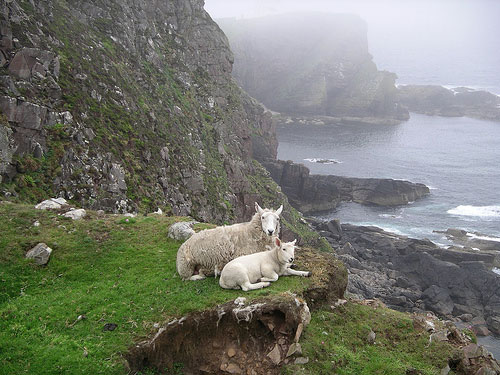Ariel Brunner is Head of EU Policy at Birdlife Europe
Earlier this month saw the European Council give the final rubberstamp to the reform of the CAP. It is now time to assess what has happened to Commissioner Ciolos’ promise of a green, fair and simple policy. Unfortunately any remotely honest evaluation of the new CAP must acknowledge that the original promise has been betrayed by Member States and the European Parliament.
In terms of the use of public money, we see a CAP where targeted Pillar 2 measures have been disproportionally reduced, while the bulk of the budget remains in completely untargeted, entitlement based payments that are not linked to any real policy objective.… Read the rest
The Ciolos CAP reform
The CAP2013 reform ended with a whimper yesterday as the Agricultural and Fisheries Council adopted the revised regulations as an A item without discussion following a first reading agreement with the European Parliament. Today the President of the Council ratified the documents in the presence of the ministers from Denmark, Cyprus and Ireland and the vice-minister from Poland. This concludes the legislative process for the 2013 CAP reform. For the first time, we now have a clean version of the four main regulations, as follows.
Direct payment regulation
Rural development regulation
Horizontal regulation
Single CMO regulation
The extended Council press release announcing the Council’s approval has a useful annex summarising the main changes which will be introduced by this reform.… Read the rest
Changing patterns of global agrifood trade
Publication of the latest United Nations International Trade Statistics Yearbook with comparative figures from 2000 to 2012 gives an insight into the important structural changes in patterns of global agrifood trade over the past decade. The figures underline the way in which developing countries have become the dynamic motor behind agrifood trade flows, a finding which has relevance when discussing the coverage of WTO trade rules.
During this period agrifood trade maintained and even increased its share of total merchandise exports. It share was 6.1% in 2000, but increased to 7.0% in 2009 following the sharp rise in global food prices in 2008-09.… Read the rest
EU agriculture: impacts of climate change
Using the CAP to promote a climate-friendly agriculture in Europe (or, as it is increasingly called, a climate–smart agriculture) was one of the stated objectives of the Commission in putting forward its CAP reform proposals in 2011. Agriculture both has a mitigation role to play in climate policy, and must also adapt to climate change.
Regarding mitigation, the Europe 2020 Strategy establishes the reduction of greenhouse gases as one of the EU’s five headline targets. Agriculture is both an emitter and a sink of greenhouse gases, and agricultural soils contain a large stock of terrestrial carbon in the form of soil organic matter.… Read the rest
Does national spending on agriculture follow a different path to the CAP?
In evaluating the pattern of budget transfers to agriculture, most of the focus is on the transfers through the EU budget. The negotiations on the Multi-annual Financial Framework (MFF) were closely followed because of their importance for the size of the CAP budget in the overall EU budget in the coming programming period.
However, in addition to EU transfers farmers also receive significant transfers from member state budgets. These take two forms: member state co-financing of CAP Pillar 2 expenditures (plus some allowed top-ups of Pillar 1 payments), and state aids paid by member states to their farmers. A proportion, but not all, of agricultural state aid represents member state spending on measures equivalent to rural development measures which would be eligible for funding under Pillar 2 if the national allocations were bigger, but which are funded instead by national exchequers.… Read the rest
Family farming and the role of policy in the EU
Last week Dacian Ciolos welcomed the launch of the UN’s International Year of Family Farming 2014 and on Friday this week the Commission is holding a conference in Brussels on “Family farming: A dialogue towards more sustainable and resilient farming in Europe and in the world”.
The Commissioner emphasised that over 95% of farm holdings in the EU are family farms, and that “family farms are the foundations on which Europe’s Common agricultural policy was built. They continue to stay at the heart of European agriculture as robust generators of competitiveness, growth and jobs, of dynamic and sustainable rural economies.”
Others take a different view of structural developments in EU farming.… Read the rest
The G-33 public stock-holding proposal for Bali
The new WTO Director-General Roberto Azevêdo gave a rather downbeat assessment last week to the WTO Trade Negotiations Committee on the state of play of the texts which are meant to be agreed at the Bali Ministerial Council in early December. In an earlier post I discussed the issues put on the table by developing countries to make up the agricultural element of this Bali ‘mini-package’. These include new rules to deal with underfill of tariff rate quotas, a halving by developed countries of their ceilings on allowed export subsidies, and an exemption for developing countries from regular WTO disciplines on purchases of food products from low-income farmers at government-set prices when used for public stock-holding.… Read the rest
CAP budget share rises as budget deadlock finally resolved
My previous post on EU budget decision-making in mid-October described the complex inter-relationships between agreement on the EU’s long term budget the Multi-annual Financial Framework, the conciliation procedure with respect to the 2014 budget and the divisions between the Council and Parliament on the Commission’s draft amending budgets to the 2013 budget seeking additional funds to avoid pushing more expenditure further into the coming year.
At the end of the post, I described an optimistic scenario in which the Lithuanian Presidency got the Council’s agreement to pay the amending budgets for 2013 and the conciliation process between Council and Parliament on the 2014 budget was successful, thus paving the way for formal approval of the political agreement already reached on the MFF.… Read the rest
The 2014 CAP transition year
The Council announced last Wednesday (October 23) that a political agreement had been reached with the Parliament on the transition measures for agriculture in 2014. This follows the publication of the Commission proposal in April and the adoption of the COMAGRI position in September (the relevant documents are available here in the European Parliament Legislative Observatory)
For direct payments and rural development, the new CAP rules will start to apply as from 1 January 2015. Council and Parliament agreed in June to postpone the implementation of the new rules on direct payments until 1 January 2015, but this seems to be the first time that the institutions have agreed that the start of rural development programmes should be pushed back to 1 January 2015.… Read the rest
Comparing support levels across countries
In the previous post I presented two tables showing Pillar 1 and Pillar 2 payments per hectare by member state which were prepared by the Scottish Executive in support of its campaign to get a higher share of the UK CAP direct payments national ceiling. My focus was on the general story which the tables told on how payments per hectare are distributed across member states, but the tables also show the comparable figures for Scotland as if it were a member state. They show that Scotland expects to be at the bottom of the EU league in terms of Pillar 1 and Pillar 2 payments per hectare by the end of the next MFF period.… Read the rest


